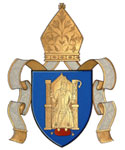 |
 |
News
Northern Ireland launch of book on Irish Anglicanism 1969-2019

The Archbishop of Armagh and Primate of All Ireland speaking at the launch.
A history of the Church of Ireland over the last 50 years was launched at Church of Ireland House, Belfast, on Tuesday evening, 3rd December by the Archbishop of Dublin and Primate of Ireland, the Most Revd Dr Michael Jackson.
Irish Anglicanism, 1969 to 2019 is published by Four Courts Press and edited jointly by Dr Paul Harron and Dr Kenneth Milne, and features 20 essays ranging across themes as broad as youth work, art and architecture, education, liturgy, the Irish language, and music. One of the essays: 'The Church of Ireland: Politics and Social Change' was written by Bishop John McDowell and Bishop Michael Burrows.
The project forms part of the Church’s D150 initiative, to mark the 150th anniversary of its Disestablishment. The Belfast event followed an initial launch in Dublin in November.
In his remarks, Archbishop Jackson reflected on a quote in Irish Anglicanism by the architect Michael Whitely: 'Poor design will hinder the expression and development of ministry rather than encourage it' and applied it more widely to life in the Church and in wider society.

The Archbishop of Dublin and Primate of Ireland the Most Revd Dr Michael Jackson.
“Many people think we just need to turn up in church but more is expected and more is asked of us,” the Archbishop stated.
“We stand on the inheritance of tradition; we look to the dynamic of engagement; we hold custodianship of the seedlings of the future of the Church of Ireland, in whatsoever ways it will express itself next.”
Dr Jackson welcomed Archbishop Justin Welby’s descriptions of the Church of Ireland, during his recent visit, as a bridge Church and a Church without borders, and drew out three ‘pictures’ of the Church from the chapters of book: reflective; reforming; and outgoing.
“I want to put on record my personal debt of gratitude to the Church of Ireland of my youth,” he added, recalling his upbringing in the Diocese of Clogher.
“Initially, they were peaceful days, and then they became destructive days, and when I returned as bishop of the diocese they were once again peaceful days.”
Irish Anglicanism, he suggested, pointed to the ongoing work of “crafting and sharing with everyone an Irish Anglicanism that is confident, articulate, active … it gives an account of itself; it does things, good things for God and for others.”

Attending the launch in Belfast of the book on Irish Anglicanism 1969-2019.